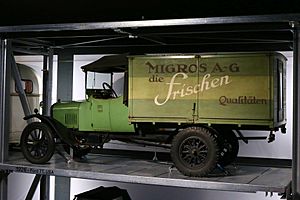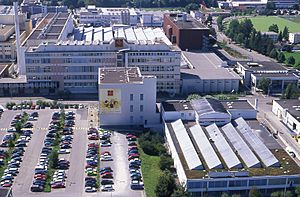Migros facts for kids
 |
|
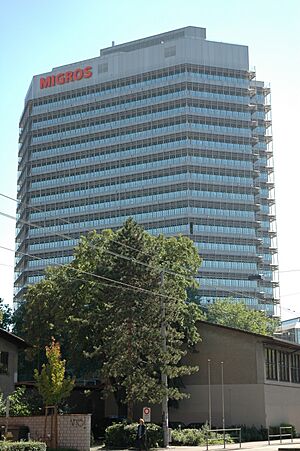
Migros headquarters in Zurich
|
|
|
Native name
|
Migros-Genossenschafts-Bund
Fédération des coopératives Migros Federazione delle cooperative Migros |
|---|---|
| Cooperative | |
| Industry | Retail |
| Founded | August 1925 |
| Founder | Gottlieb Duttweiler |
| Headquarters | , |
| Products | Supermarkets, food industry, petrol, electronics, books, home-wares, etc. |
| Revenue | 32.00 billion CHF (2024) |
|
Operating income
|
668 million CHF (2021) |
|
Number of employees
|
97,541 (2021) |
Migros is Switzerland's biggest retail company. It is also the largest supermarket chain and the largest employer in Switzerland. Migros is one of the forty largest retailers in the world. It is set up as a cooperative federation, which means it is owned by its more than two million members.
Migros helped start a large retail company in Turkey also called Migros. This company became fully independent from Migros Switzerland in 1975.
The name "Migros" comes from French words. "Mi" means half or mid-way, and "gros" means wholesale. So, the name suggests prices that are halfway between regular retail prices and wholesale prices. The company's logo is a big orange M. People often call Migros "the orange giant".
Contents
History of Migros
Migros was started in 1925 in Zurich, Switzerland. It was founded by Gottlieb Duttweiler. His idea was to sell just six basic food items at very low prices.
Early Days and Mobile Shops
At first, Duttweiler sold only coffee, rice, sugar, pasta, coconut oil, and soap. He sold these items from five lorries (trucks) that traveled from village to village. This way, he could sell directly to people who didn't have easy access to markets.
Other businesses didn't like this idea because it cut out the middleman. They tried to stop producers from selling to Migros. To fight back, Migros started making its own products. They began with meat, milk, and chocolate.
Duttweiler and his drivers added more products. In 1926, the first Migros store opened in Zurich. His second store, in Ticino, was set up as a cooperative. This was a hint of how the company would grow.
Becoming a Cooperative
By 1941, Gottlieb Duttweiler had built many stores. But in that year, he decided to give the business to his customers. He changed all his privately owned companies into regional cooperatives. These cooperatives were then led by the Federation of Migros Cooperatives. This means that the customers became the owners of Migros.
Expanding Services
Migros quickly grew beyond just selling food.
- In 1935, Duttweiler started the Hotelplan travel agency.
- In 1942, Migros launched a weekly magazine called Wir Brückenbauer. It is now known as Migros Magazine.
- Other new ventures included restaurants in 1952.
- Filling stations (Migrol) opened in 1954.
- Language schools (Eurocentres) started in 1956.
- The Migros Bank was founded in 1957.
- An insurance company began in 1959.
In 1948, an economist named Elsa Gasser suggested that Migros stores use the self-service method. This idea helped Migros become Switzerland's most successful supermarket chain.
International Growth and Changes
In 1954, Migros entered the Turkish market. They formed Migros Türk with the Istanbul City Council. However, Migros Switzerland sold its share of Migros Türk in 1975. Migros Türk is now the largest retailer in Turkey.
It wasn't until 1993 that Migros opened another supermarket outside Switzerland. This one was in Thoiry, near Geneva, France.
In 1986, Migros opened its first recreation park, Säntispark.
Focus on Sustainability
In 1995, Migros introduced its "Migros Bio" organic label. These products follow strict organic guidelines. In 2017, they added "Migros Bio Suisse" for organic products with at least 90% Swiss ingredients.
In October 2012, Migros bought the German food store chain Tegut. However, in 2013, Migros sold its four Migros-branded stores in Germany.
In 2016, Migros announced it would stop giving out free plastic bags at check-out. They had tested this in one area since 2013. The test showed a 90% drop in plastic bag use. Migros was the first to do this across Switzerland, starting on November 1, 2016. Any money made from selling plastic bags goes to environmental projects.
In 2024 and 2025, Migros sold several parts of its business. These included bike shops, DIY stores, electronics, furniture, sports shops, travel agencies, and cosmetic factories. This was done to focus on four main areas in Switzerland: food retail, non-food retail, banking, and health.
Migros Philosophy
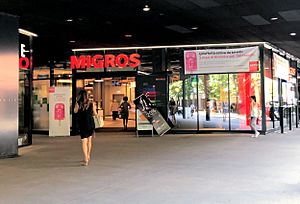
Gottlieb Duttweiler cared about his customers' health. He decided that Migros would not sell any alcoholic beverages or tobacco. This rule is still in place today for Migros supermarkets. However, Denner, which is owned by Migros, does sell alcohol and cigarettes.
Here are some key ideas behind Migros and its "responsible" way of doing business:
- It does not sell any alcoholic beverages or tobacco in its main supermarkets.
- It does not pay out any dividends (extra money to owners).
- If the company earns a lot of profit, the supermarkets have to lower their prices.
- It is set up as a cooperative. This means it is owned by its members.
- Any adult living in Switzerland can become a member for free and vote on company matters.
- Migros uses 1% of its total sales money for social and cultural projects. This is called Migros Kulturprozent ("cultural percent").
Migros also strongly supported women's suffrage in Switzerland (the right for women to vote). They helped fund campaigns for women's voting rights in the 1959 and 1971 national votes. For the successful 1971 vote, Migros even gave out paper bags with ads supporting the "yes" campaign. Their weekly company magazine, which reached about 600,000 people, published articles supporting women's suffrage for weeks before the vote.
Gottlieb and Adele Duttweiler's "fifteen theses" from 1950 guide Migros's values. They talk about "serving the community" and putting "people at the center of the economy." They also state that the "general interest will be placed higher than the interests of the Migros cooperatives."
In 2021, Migros thought about selling alcohol in its supermarkets. A vote was held in June 2022. The idea to sell alcohol was rejected by a very large number of members in all ten regional cooperatives.
Migros Today
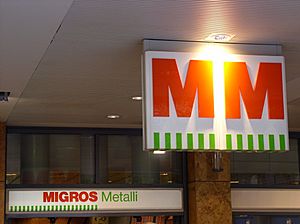
Today, Migros is still organized as a cooperative society. A large part of the Swiss population are members of the Migros cooperative. This means Migros is a supermarket chain owned by its customers. More than 90% of the products sold in Migros stores are made by its own companies.
Migros is committed to spending one percent of its yearly sales on cultural projects. The part of the company that handles this is called Migros Kulturprozent.
Migros supermarkets are grouped into three sizes: M, MM, and MMM. The company's loyalty card is called the M-cumulus card.
M-Budget and Migros Sélection Products
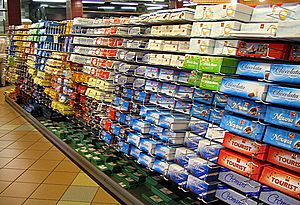
In 1996, Migros launched its budget range called M-Budget. It started with seventy products for people with lower incomes and large families. Now, it has grown to 330 products. These include mountain bikes, snowboards, MP3 players, milk chocolate, jeans, and shoes. M-Budget products have a special green and white packaging design.
Many M-Budget products are made in limited amounts. Whether they become a regular part of the Migros range depends on how popular they are. This makes some M-Budget items special and even collectible.
To promote the M-Budget range, Migros created "M-Budget Party" tickets in the early 2000s. These tickets cost 9.90 Swiss francs and included free non-alcoholic drinks and snacks.
In 2005, Migros also launched M-Budget Mobile. This is a pay-as-you-go mobile phone service.
Also in 2005, Migros introduced a premium line called Migros Sélection. These are mostly food products that are more expensive and prepared in special ways. Sélection products have their own pearl white and gold packaging.
In April 2006, Migros announced the M-Budget credit card. It had a very low yearly fee at first. After its main competitor, Coop, offered a credit card with no annual fee, Migros also removed its fee.
In 2014, Migros started using self-service checkouts in its stores.
Migros Companies
Migros owns many different companies.
- Retail:
* Migros supermarkets * Migrolino: small convenience stores, often at petrol stations * Denner: a discount supermarket chain * Digitec Galaxus: shops and online stores for electronics, home goods, and sports equipment * LeShop.ch: an online supermarket * Do it+Garden: DIY stores and garden centres
- Finance:
* Migros Bank: a bank * Change Migros: for exchanging currency
- Health:
* Medbase * Bestsmile: a Swiss company for teeth straightening and dental care
- Other:
* Migros Klubschule (Migros Club Schools): adult education centers * Eurocentres: language schools * Ex Libris: bookshops * FitnessPark: fitness centres * Glattzentrum: a large shopping mall near Zurich * Golfpark: public golf courses * Florissimail: a service for sending flowers by mail * Migrol: petrol stations * Monte Generoso Railway: a mountain railway owned by Migros
M-Industry
Many products sold in Migros supermarkets are made by its own companies, called M-Industry. Most of these are in Switzerland. In 2017, M-Industry had 32 companies, 25 of which were in Switzerland. They make over 20,000 products for Migros stores.
Some M-Industry companies include:
- Aproz: makes mineral waters, fruit drinks, and juices
- Bischofszell: makes iced tea, fruit juices, snacks, and jams
- Delica: makes coffees, dried fruits, nuts, and spices
- Estavayer Lait SA (ELSA): makes milk and yogurts
- Frey: makes chocolate and chewing gums
- Jowa: makes breads and pastries
- La Risiera: makes rice
- Micarna: processes meat and fish
- Midor: makes biscuits and ice creams
- Mifroma: makes Raccard, Gruyère, and Appenzeller cheese
M-Industry products are sold in fifty countries around the world.
Competitors
Migros's main competitor is Coop. Coop is Switzerland's second-largest supermarket chain. It also has a cooperative structure, similar to Migros.
Other competitors include the Manor department store chain. More recently, German discount stores like Aldi and Lidl have also opened supermarkets in Switzerland.
In January 2007, Migros bought 70% of Denner's shares. This brought together the largest and third-largest food retail chains in Switzerland. This move was made to help Denner compete better with growing foreign competition.
See also
 In Spanish: Migros para niños
In Spanish: Migros para niños
- List of supermarket chains in Switzerland
- Park im Grüene
 | James Van Der Zee |
 | Alma Thomas |
 | Ellis Wilson |
 | Margaret Taylor-Burroughs |


